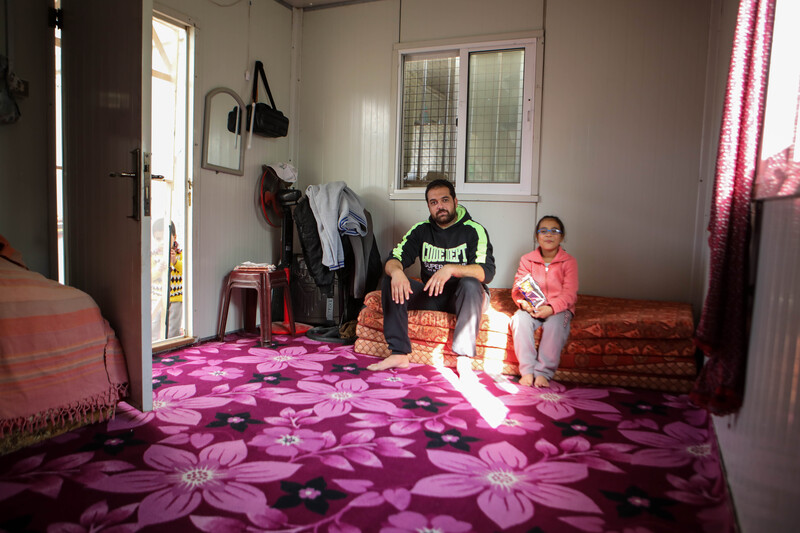The Electronic Intifada 8 July 2019

Kafa al-Wadia needs treatment for arthritis but cannot afford it.
The Electronic IntifadaKafa al-Wadia and her family only had $100 between them when they arrived in Gaza eight years ago.
In August 2011, the family fled Daraa in southwestern Syria shortly after civil war erupted in that country. Their travels brought them to Gaza, where they had a number of relatives. Little did they expect that their suffering was about to get worse.
Today, Kafa lives with her son Omar al-Hourani, his wife and their four children in Maghazi, a refugee camp in central Gaza.
Kafa has arthritis but cannot afford treatment. “Poverty is killing us,” she said.
Before leaving Syria, her son Omar had a job in a recycling plant. He has been unable to find work in Gaza.
“Life under the Israeli siege is impossible,” Kafa added.
Palestine is the native land of Kafa and her family. The al-Hourani clan had to leave their native al-Masmiyya al-Saghira – a village in historic Palestine – when it was attacked by Zionist forces in 1948. The clan took refuge in Gaza.
Ali al-Hourani, Kafa’s former husband, fled Gaza during the 1960s.
He had resisted the Israeli invasion of Gaza in June 1967, which led to an enduring military occupation. Ali spent 10 months in an Israeli jail before being exiled to Jordan, from where he moved to Syria.
Kafa wants to leave Gaza, though she has ruled out going back to Syria. Doing so would be too traumatic. Her only other son was killed there in 2013.

Omar al-Hourani has been unable to find work in Gaza.
The Electronic Intifada“My son [Omar] and I are looking for a way to travel [away from Gaza],” she said.
An estimated 360 families – totaling 1,200 people – have left Syria for Gaza since 2011. Most came between 2011 and 2013 and traveled through the Rafah crossing, which separates Gaza and Egypt.
In those years, Egypt was headed by Mohammed Morsi, who died recently after years of being denied proper medical treatment while in detention following his overthrow in a military coup.
Although the Morsi-led authorities kept on enforcing the Israeli-imposed siege of Gaza, some easing of travel restrictions did occur. As a result, a number of refugees from Syria were able to enter Gaza through Rafah.
“Death at any moment”
Omar Odeh, who heads a support group for refugees in Gaza, is frustrated by how victims of the war in Syria have been treated.
Both Hamas, which heads the internal administration in Gaza, and the Palestinian Authority, headquarted in the West Bank city of Ramallah, had pledged support for the refugees. The support did not materialize.
“There are officials in Gaza and Ramallah – I would prefer not to mention their names – who promised help to the Syrians during their first few months here, help with securing jobs,” said Odeh.
“But, in reality, they [the refugees] have lived in poverty and hunger. Some have even been imprisoned because they could not pay debts. Others have been ill, without receiving medicine.”

After fleeing Syria, many refugees are struggling to survive in Gaza.
The Electronic IntifadaAccording to Odeh, almost 160 of the families who entered Gaza from Syria are in very difficult economic circumstances.
Hamouda Ayoub, 31, is among the refugees from Syria who have left Gaza for Europe.
Ayoub grew up in Yarmouk, a refugee camp in the Damascus area which has been the scene of bitter fighting during Syria’s civil war. After fleeing the besieged camp, he spent six years in Gaza.
That period included Israel’s major attack on Gaza in July and August 2014.
“The Israeli occupation terrified us more than the sounds of shooting in Syria,” he said. “Israel doesn’t know how weak we are. We went through very difficult times during the 2014 war on Gaza. I expected death at any moment.”
Ayoub left Gaza last year. He moved first to Turkey, then to Sweden, where he has found work as a cleaner in a restaurant.
He refers to leaving Gaza as the “third displacement.” It follows two other occasions when his family was uprooted.
The first displacement was during the Nakba, the 1948 ethnic cleansing of Palestine. At that time, the family had to flee the city of Haifa. The second was the family’s departure from Syria during its civil war.
“Sometimes I went begging”
Sami Yassin, 39, has a similar story of upheaval.
His family is originally from Bisan, a town in historic Palestine occupied by Zionist forces in May 1948. The family moved to Syria.
Although his grandfather lived in Yarmouk camp, Sami himself grew up in the Homs region.
Sami arrived in Gaza in December 2012. “I worked in a number of jobs that were badly paid – $3 a day,” he said. “Sometimes I went begging.”
He had hoped that his brothers Mumin and Rida would join him in Gaza. Yet in May 2014, he received the dreadful news that they were among the civilians killed in Yarmouk camp.
In August 2014, Sami was injured in his leg when Israel attacked a high-rise Gaza building known as the Italian Compound.
“I was near the Italian Compound at the time,” he said. “At that moment, I decided to leave Gaza and face the risk of dying in the Mediterranean, rather than at the hands of the Israelis.”
Last year, Sami spent two months being smuggled – along with his wife and daughter – through Turkey and then on to Greece. He eventually made it to Belgium in October.
In April this year, he obtained the status of permanent resident from the Belgian authorities.
Ahmad Khalil, 42, is a Palestinian refugee from Syria who fled to Gaza in 2013. Now, he wants to leave.
“There is no safe place in Gaza,” he said. “Israel keeps bombing us. This reminds us of how we were being bombed in Yarmouk camp. My children are afraid of being killed by hunger or by Israeli warplanes. So I am looking for a way to go to Europe.”
Ola Mousa is an artist and writer from Gaza.





